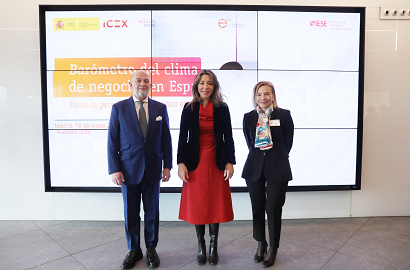Foreign-owned businesses established in Spain show improved employment figures for 2022

Presentation of the 15th Business Climate Barometer, prepared by ICEX, Multinacionales por Marca España and the IESE business school
employment figures for foreign-owned companies improved over 2022 in comparison with the previous year. This meant that 91% of companies either expanded or maintained their workforce, whereas only 9% reduced it compared to 2021 when 12% of companies said they had reduced employee numbers. This is one of the main conclusions of the 15th edition of the “Spanish Business Climate Barometer survey of Foreign Investors”. Jointly published by ICEX-Invest in Spain, Multinacionales por Marca España and the International Center for Competitiveness at the IESE Business School, it includes the rating and importance given to the business climate in Spain in the opinion of over 720 foreign companies.
The Barometer was presented at a conference attended by Xiana Méndez, Secretary of State for Commerce; Elisa García Grande, Executive Director of ICEX-Invest in Spain; Álvaro Álvarez, President of Multinacionales por Marca España; the Director of Corporate Development at IESE, Natalia Centenera, and María Luisa Blázquez, Associate Researcher at the IESE Business School’s International Center for Competitiveness.
Xiana Méndez said that, in the current challenging context, “Spain is in a more favourable economic dynamic than our neighbouring countries. The export sector is a decisive factor in this current positive evolution, as Spanish companies are exporting more than ever, achieving record highs. Furthermore, foreign investment has brought us excellent news in 2022, both quantitatively and qualitatively, with growth from January to September standing at around 55% compared to the same period the previous year”.
The Secretary of State highlighted the deployment of European funds under the Recovery, Transformation and Resilience Plan, which “comprises an ambitious programme of structural and legislative reforms aimed at addressing the main challenges facing our country, many of which directly affect the business and investment climate. These reforms will have a positive impact on the business climate, which will without a doubt be evaluated in subsequent editions of the Barometer”.
Investment and export forecasts maintained
In general, Investment firms reported a very positive performance in 2021, although the closing figures for 2022 and the forecast for 2023, despite remaining positive, have been affected by the uncertainty of the international political and economic situation.
84% of companies do therefore plan to increase or maintain their investments. Turnover prospects in Spain are what most clearly reflect the current challenging economic situation and future uncertainty, since 20% of companies expect to see a reduction in turnover in 2023, while the percentage of those expecting to see an increase has dropped from 59% in 2022 to 49% in 2023.
In terms of total exports, 70% of the foreign companies surveyed export from Spain to third markets. The outlook is positive, although slightly down on 2021. In that year, just 8% of companies saw a downturn in exports; this is expected to increase to 10% in both 2022 and 2023.
Infrastructure and human capital, highly valued
The factors most highly rated by foreign investors were those related to infrastructure - specifically airports, roads, telecommunications structures and services, ports and high-speed train lines - followed by market size and human capital; they also valued the availability of a skilled workforce, with university level qualifications and a willingness to learn. Once again this year these factors also coincide with those ranked most highly by respondents when it comes to investing in a foreign country.
Among the factors considered to be of lowest importance this year are the cost of electricity and other energy sources such as gas, diesel and petrol, and transport. Other weaknesses are related to aspects of the regulatory environment, such as the speed and efficiency of the commercial courts and bureaucracy.
New developments: the impact of the invasion of Ukraine
This edition included two questions on the impact that the Russian invasion of Ukraine is having on business performance. In this respect, the barometer shows that impact has been either high or very high for 50% of companies, with just 7% considering that the conflict has had a low impact on their activity. With regard to the effect of the war crisis on business management, the impact on energy costs stands out, being mentioned by 88% of companies. In total, 56% of companies also indicated that the war has had an important impact on supply shortages and has generated problems in distribution logistics according to 41% of the managers consulted.
As in the last edition, the report includes an analysis of the sustainability goals of foreign companies in Spain, due to the fact that the commitment to sustainable development, as defined in the UN's 2030 Agenda, is not only considered a priority for the public sector, but also for an increasing number of private companies.
According to the barometer, there are several factors that favour the development of sustainability strategies for foreign companies in Spain, including awareness among consumers and society as a whole, and especially among the workers themselves. The responsible behaviour of suppliers and customers are also factors that contribute to the successful development of these strategies.
The Spanish Business Climate Barometer survey of Foreign Investors can be downloaded here.




